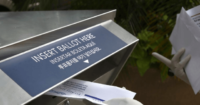Absentee / Mail-in Voting
All states have some form of absentee or mail-in voting due to federal requirements. These voters normally include military and overseas citizens, voters with disabilities and students who reside in a different state. For example, absentee or mail-in ballots are sent to these military and overseas voters 45 days prior to federal elections. However, absentee or mail-in voting is often limited by states to a number of valid excuses based on age, absentee status or an inability to vote on Election Day.
Some states have a greater number of reasons and valid excuses to vote absentee ballots by mail or in-person in an election office. A number of states have no-excuse absentee or mail voting. Lastly, a number of states have implemented an entire method of mail-in balloting that includes return of ballots to secure boxes or by postal mail. Oregon instituted an all-mail-in balloting system in 1998 and other states like Washington and Colorado have instituted similar all mail ballot methods of voting.
Mail-in and absentee balloting provides certain vulnerabilities to the electoral system:
- One stated general purpose for no-excuse absentee or mail ballot voting is to increase convenience and reduce long lines on Election Day. However, “Election Day” has become “Election Month,” which has increased the overall costs of election administration. County election offices that must process a large number of mailed ballots will experience significant delays in releasing official election results. A month or more of voting dramatically increases the overall costs to political campaigns for poll watching and get-out-the-vote efforts prior to Election Day.
- Mail-in ballots are not cast in the secure polling place where precinct poll workers can confirm addresses and verify identification. A great deal of voter fraud and abuse of absentee and mail-in ballots has been documented across the country. Absentee or mail-in balloting may spur a short-term increase in turnout in local elections; however, there is no evidence that voting by mail increases overall turnout for the long term in general elections.
- Absentee or mail-in balloting requires the use of the U.S. Postal Service (USPS) to transmit and return the ballot. This often causes delays to the election office. Citizens in states that use mail-in ballots often authorize the return of ballots to secure mail boxes that voters can use if they distrust the postal service.
A number of states authorize or require in-person absentee voting with verification by voter ID, and some states require a voter ID at the time of absentee or mail-in ballot request or return.
Alternatively, many states that allow absentee or mail-in voting use signature comparison to verify the identity of the voter. Many believe that signature verification is error-prone and not uniformly implemented by election officials across the country. While signature verification does catch a small percentage of invalid ballots or voter fraud, the system often fails to identify a great many irregularities associated with absentee or mail-in voting. Alternatively, many argue that signature verification routinely disenfranchises thousands of voters when it is used to ferret out an invalid signature.
ACRU Commentary
The Left’s Felony Assault on Voting
Convicted felons remain on the poll books used on Election Day in Philadelphia.
Terry McAuliffe — Virginia’s Voter-Fraud Guru
The governor overlooks illegal activity and vetoes laws to prevent it.
Election Fraud Must Be Stopped
How could anyone oppose the practice of showing a photo identification to ensure that you’re you?
How Black Democrats Stole Votes (from Blacks) in Alabama … and Jeff Sessions Tried to Stop It
It was spun from thin air by Sen. Ted Kennedy and his allies to block the 1986 appointment of Sessions to the federal bench and now resurrected by the NAACP and Democrats.
Arizona’s Missing Election Results Prove Early and Mail-In Voting Is a Bad Idea
A quarter of Arizona’s vote had not been counted a full day after the election because of mail-in voting.
Vote Fraud as Rare as Lightning Strikes?
It’s a favorite Democratic talking point. It’s also completely false.
News
Democrat groups call for election month
The Constitution is a malleable document for liberals. When it suits their needs, they use it. When it doesn’t, they ignore it. Article I makes it clear that the authority to determine the date and time of elections is not vested in liberal activists or their lawyers who now want to extend the national election to … whenever. This is why judicial appointments matter.
Thousands Of Mail-Voting Ballots Rejected For Arriving Late
A rally outside the Montclair, N.J., town hall on July 1. Protesters hung 1,101 absentee ballots to represent the number of votes that weren't counted in a mayoral election that was decided by just 195 votes.Mail-in voting, which tens of millions of Americans are expected to use this November, is fraught with potential problems. Hundreds of thousands of ballots go uncounted each year because people make mistakes, such as forgetting to sign the form or sending it in too late.
Las Vegas: 223K Mail-In Ballots Bounced as ‘Undeliverable’ in Election
More than 223,000 mail-in ballots sent to registered voters in Clark County, Nevada, were bounced as “undeliverable” in the state’s June primary election, newly released data reveals.
California Rejects 100K Mail-In Ballots From March Primary Because Of Mistakes
More than 100,000 mail-in ballots were rejected by California election officials during the March presidential primary, according to data obtained by The Associated Press that highlights a glaring gap in the state’s effort to ensure every vote is counted.
Help us correct the Vote By Mail/Absentee ballot “equivalence” deception
Absentee ballots and universal vote by mail (“VBM”) schemes proposed by Democrats are not the same. Absentee ballots are requested by a voter and sent to that voter’s residence. With Universal VBM, the state sends applications or ballots to an address with no confirmation of recipients’ names or voting status. Even some Republican governors don’t get it. We hope you will help explain this critical difference to everyone you know.
1 in 5 Ballots Rejected as Fraud Is Charged in N.J. Mail-In Election
Following accusations of widespread fraud, voter intimidation, and ballot theft in the May 12 municipal elections in Paterson, N.J., state Attorney General Gurbir S. Grewal (pictured) announced Thursday he is charging four men with voter fraud – including the vice president of the City Council and a candidate for that body.










